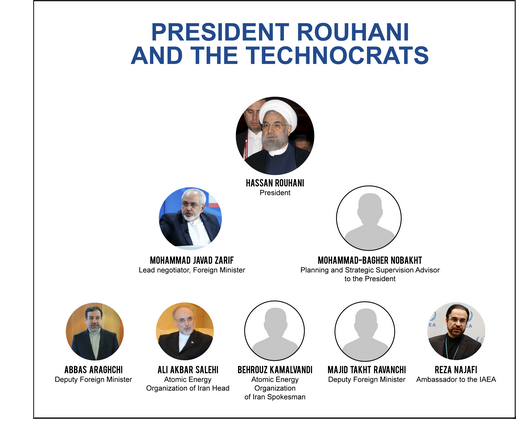{{currentView.title}}
September 02, 2015
Iran's interpretation of the nuclear deal is not an easy sell
Iranian President Hassan Rouhani has had to sell the nuclear deal to his people as energetically as President Obama. He and his technocratic assistants have been forced to clarify their interpretation of the agreement in the process, yielding some interesting insights into what the Iranians think they have committed to and gained. (Click here for quotations and links to sources.)
- Not a treaty…but binding. Rouhani and the negotiators have been explicit that the deal (the Joint Comprehensive Plan of Action or JCPOA) is not a treaty, protocol, or convention, and thus does not need to be ratified by the Iranian Parliament. They face criticism from various Parliamentary and clerical factions for refusing to submit it for a vote. They have not suggested, however, that the agreement is any less binding for that.
- Iran can pursue the development of missiles without any restrictions. Rouhani has argued repeatedly that the only restrictions on Iran’s missile development are in UN Security Council Resolution 2231 (by which the UN implemented the deal), not in the JCPOA itself, and are therefore not restricted by the agreement.
- Iran can violate the UN Security Council Resolution without violating the JCPOA. Rouhani and his technocrats have declared that a violation of UNSCR 2231 does not constitute a violation of the JCPOA. Sanctions do not, therefore, snap back if Iran violates the UNSCR—but only if it violates the agreement.
- Iran intends to violate the UNSCR restrictions on weapons sales and imports. Rouhani has said, “We will sell and buy weapons whenever and wherever we deem it necessary…we will not wait for permission from anyone or any resolution.” Deputy Foreign Minister Abbas Araghchi reportedly said that the restrictions in the UNSCR “are not binding for us.” Atomic Energy Organization of Iran Head Ali Akbar Salehi said that in UNSCR 2231 weapons “bans became restrictions…This means that the weapons ban has been shoved aside.” Iranian Minister of Defense Hossein Dehghan has said that Iran is negotiating to purchase Sukhoi fighter aircraft from Russia.
- Iran has not agreed to inspect Parchin itself…or to let anyone else inspect it. Rouhani’s technocrats have denied Associated Press reports of a secret protocol by which Iranian inspectors would “inspect” Parchin. They have not, however, indicated that there is any agreement by which anyone else would inspect it. Iranian military and IRGC leaders have, on the contrary, repeatedly denied that there will be any inspections of military facilities. Neither Rouhani nor his technocrats have corrected them.
- All sanctions will be lifted. Rouhani and his aides continue to promise the Iranian people that all sanctions will be lifted, not just nuclear-related sanctions, as the Obama Administration claims. He has spoken of “the complete and simultaneous removal of the economic sanctions.” Salehi has said “the EU will cancel their own sanctions after 90 days and the American president will also cancel sanctions.” Deputy Foreign Minister Majid Takht Ravanchi stated that anything related to Iran’s economy including “financial, banking, transportation, and insurance” will be lifted when sanctions are lifted. (Click here for additional statements.)
Someone is in for disappointment. Either the Iranian government will, indeed, violate bans on weapons procurement and missile development and will, as it has claimed, receive full sanctions relief, or the disappointment of the Islamic Revolutionary Guards Corps and the people will be deep. If the Guards and Iran’s businessmen are made happy, on the other hand, then the US and the EU will not have gotten (or implemented) the deal they were promised. Only one thing is perfectly clear: Rouhani’s interpretation of the nuclear deal cannot be reconciled with Obama’s. That is a problem.

